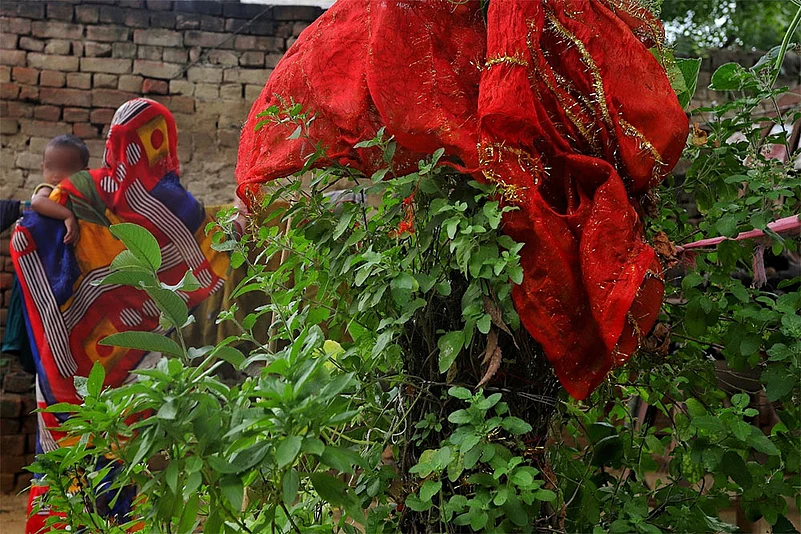When she was 16, the young girl had brought home a tulsi sapling from a local field where the holy basil (Ocimum tenuiflorum) grows in the wild. Like all devout Hindus, the Dalit girl had planted the sapling in the courtyard of her house, hoping that the plant considered divine by millions will keep her family safe from misfortune and also bring good health. The sapling is now a leafy, full-grown plant, standing proud in the middle of the courtyard of the modest house in Bulgarhi village, in Uttar Pradesh’s Hathras district. A piece of red cloth with golden borders—a ‘chaddar’ offered to the mother goddess—lies draped over the plant.
Advertisement
For the Dalit family, the tulsi remains a fragrant memory of the young woman who died a year ago aged 19, two weeks after she was gangraped by four upper caste men of the same village. “It gives us a feeling that she is still around,” says the 52-year-old father of the woman, his eyes welling up at the very mention of his only daughter, whose gang rape and death had left the nation numb with shock. Local police had hurriedly cremated her body within hours of her death, allegedly without informing her family.
“Do you know why the tulsi reminds us so much of her?” he asks. “It is not just because she had planted it. It is because it seems that my daughter sends us a message that she is with us,” he adds. The names of family members cannot be divulged as the Supreme Court had barred media from publishing their names, photographs and videos to protect the victim’s identity.
The human heart has a billion ways of grieving. For the distraught parents, the tulsi gives them to a reason to remember a loving soul that was cruelly snatched from them. For the grieving mother, 45, the tulsi speaks to her in a different manner. “During winters, around the months of December and January, the plant’s leaves used to wither due to extreme cold when though my daughter used to water it regularly.”
The mother adds: “But last December and this January, the leaves didn’t wither at all. The plant remained evergreen throughout the year. We are really surprised. We feel that she is around. She is making us feel her presence through this tulsi tree.”
On a rope strung on the veranda hangs a green-and-red saree—the same saree the mother says she was wearing when the news of her daughter’s death in a Delhi hospital on September 29 came in. The saree too remains a painful reminder of the day. And the grief overflows when the victim comes up in conversations.
Sitting close by and listening to other family members speak to the Outlook reporter, the victim’s 75-year-old grandmother tries to speak but breaks down as she is overcome by emotions. The victim’s younger brother intervenes, “She is still in pain. It is very difficult for her to relive what we had gone through last year. After the incident, she has become quiet and keeps her feelings to herself.”
Family members said that since September 14 this year—a year after the incident—there has been a steady flow of media personnel to their house. “All ask more or less the same questions. My grandmother is around and she listens to all that. Then, she complains of uneasiness,” the brother adds. “We are thankful to you all for highlighting our plight.”
In one room of the house is a copper pitcher containing the ashes of the victim—the father says, he will immerse them in Ganga only after the guilty are punished. All four accused are in jail. “The ashes keep reminding us that her soul hasn’t rested in peace. It gives us strength to fight on,” the father adds.




















